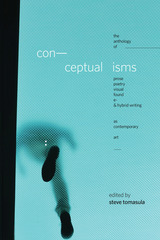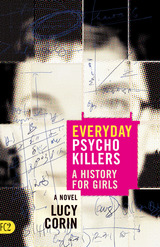2 books about Corin, Lucy

Conceptualisms
The Anthology of Prose, Poetry, Visual, Found, E- & Hybrid Writing as Contemporary Art
Edited by Steve Tomasula
University of Alabama Press, 2022
A wide-ranging anthology of experimental writing—prose, poetry, and hybrid—from its most significant practitioners and innovators
A variety of names have been used to describe fiction, poetry, and hybrid writing that explore new forms and challenges mainstream traditions. Those phrases include experimental, conceptual, avant-garde, hybrid, surfiction, fusion, radical, slip-stream, avant-pop, postmodern, self-conscious, innovative, L=A=N=G=U=A=G=E writing, alternative, and anti- or new literature. Conceptualisms: The Anthology of Prose, Poetry, Visual, Found, E- & Hybrid Writing as Contemporary Art is the first major anthology of writing that offers readers an overview of this other tradition as it lives in the early decades of the 21st century.
Featuring over 100 pieces from more than 90 authors, this anthology offers a plethora of aesthetics and approaches to a wide variety subjects. Editor Steve Tomasula has gathered poems, prose, and hybrid pieces that all challenge our understanding of what literature means. Intended as a collection of the most exciting and bold literary work being made today, Tomasula has put a spotlight on the many possibilities available to writers and readers wishing for a glimpse of literature’s future.
Readers will recognize authors who have shaped contemporary writing, as among them Lydia Davis, Charles Bernstein, Jonathan Safran Foer, Shelley Jackson, Nathaniel Mackey, David Foster Wallace, and Claudia Rankine. Even seasoned readers will find authors, and responses to the canon, not yet encountered. Conceptualisms is a book of ideas for writers, teachers and scholars, as well as readers who wonder how many ways literature can live.
The text features headnotes to chapters on themes such as sound writing, electronic literature, found text, and other forms, offering accessible introductions for readers new to this work. An online companion presents statements about the work and biographies of the authors in addition to audio, video, and electronic writing that can’t be presented in print. Visit www.conceptualisms.info to read more.
A variety of names have been used to describe fiction, poetry, and hybrid writing that explore new forms and challenges mainstream traditions. Those phrases include experimental, conceptual, avant-garde, hybrid, surfiction, fusion, radical, slip-stream, avant-pop, postmodern, self-conscious, innovative, L=A=N=G=U=A=G=E writing, alternative, and anti- or new literature. Conceptualisms: The Anthology of Prose, Poetry, Visual, Found, E- & Hybrid Writing as Contemporary Art is the first major anthology of writing that offers readers an overview of this other tradition as it lives in the early decades of the 21st century.
Featuring over 100 pieces from more than 90 authors, this anthology offers a plethora of aesthetics and approaches to a wide variety subjects. Editor Steve Tomasula has gathered poems, prose, and hybrid pieces that all challenge our understanding of what literature means. Intended as a collection of the most exciting and bold literary work being made today, Tomasula has put a spotlight on the many possibilities available to writers and readers wishing for a glimpse of literature’s future.
Readers will recognize authors who have shaped contemporary writing, as among them Lydia Davis, Charles Bernstein, Jonathan Safran Foer, Shelley Jackson, Nathaniel Mackey, David Foster Wallace, and Claudia Rankine. Even seasoned readers will find authors, and responses to the canon, not yet encountered. Conceptualisms is a book of ideas for writers, teachers and scholars, as well as readers who wonder how many ways literature can live.
The text features headnotes to chapters on themes such as sound writing, electronic literature, found text, and other forms, offering accessible introductions for readers new to this work. An online companion presents statements about the work and biographies of the authors in addition to audio, video, and electronic writing that can’t be presented in print. Visit www.conceptualisms.info to read more.
[more]

Everyday Psychokillers
A History for Girls, A Novel
Lucy Corin
University of Alabama Press, 2004
Interweaving history, myth, rumor, and news, this first novel explores what it means to grow up as a girl in a culture of girl-killers
In Everyday Psychokillers spectacular violence is the idiom of everyday life, a lurid extravaganza in which all those around the narrator seem vicarious participants. And at its center are the interchangeable young girls, thrilling to know themselves the object of so much desire and terror.
The narrative interweaves history, myth, rumor, and news with the experiences of a young girl living in the flatness of South Florida. Like Grace Paley's narrators, she is pensive and eager, hungry for experience but restrained. Into the sphere of her regard come a Ted Bundy reject, the God Osiris, a Caribbean slave turned pirate, a circus performer living in a box, broken horses, a Seminole chief in a swamp, and a murderous babysitter. What these preposterously commonplace figures all know is that murder is identity: "Of course what matters really is the psychokiller, what he's done, what he threatens to do. Of course to be the lucky one you have to be abducted in the first place. Without him, you wouldn't exist."
Everyday Psychokillers reaches to the edge of the psychoanalytical and jolts the reader back to daily life. The reader becomes the killer, the watcher, the person on the verge, hiding behind an everyday face.
In Everyday Psychokillers spectacular violence is the idiom of everyday life, a lurid extravaganza in which all those around the narrator seem vicarious participants. And at its center are the interchangeable young girls, thrilling to know themselves the object of so much desire and terror.
The narrative interweaves history, myth, rumor, and news with the experiences of a young girl living in the flatness of South Florida. Like Grace Paley's narrators, she is pensive and eager, hungry for experience but restrained. Into the sphere of her regard come a Ted Bundy reject, the God Osiris, a Caribbean slave turned pirate, a circus performer living in a box, broken horses, a Seminole chief in a swamp, and a murderous babysitter. What these preposterously commonplace figures all know is that murder is identity: "Of course what matters really is the psychokiller, what he's done, what he threatens to do. Of course to be the lucky one you have to be abducted in the first place. Without him, you wouldn't exist."
Everyday Psychokillers reaches to the edge of the psychoanalytical and jolts the reader back to daily life. The reader becomes the killer, the watcher, the person on the verge, hiding behind an everyday face.
[more]
READERS
Browse our collection.
PUBLISHERS
See BiblioVault's publisher services.
STUDENT SERVICES
Files for college accessibility offices.
UChicago Accessibility Resources
home | accessibility | search | about | contact us
BiblioVault ® 2001 - 2024
The University of Chicago Press









